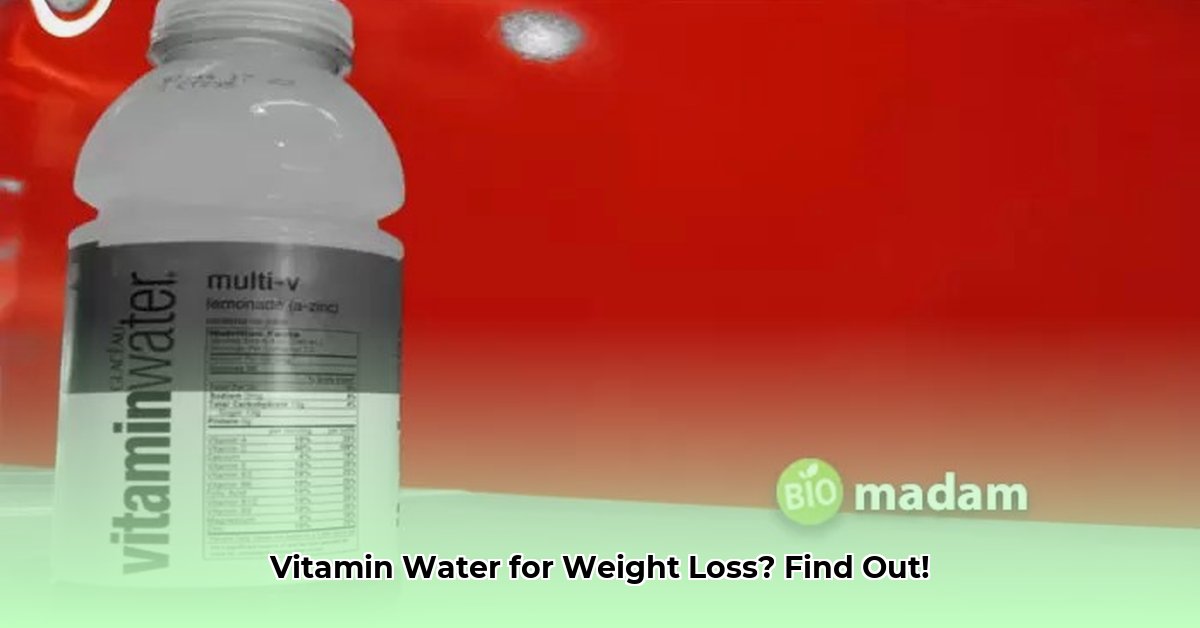
Is Vitamin Water Good for Weight Loss?
The question of whether Vitamin Water aids weight loss isn't a simple yes or no. The answer depends heavily on the specific product and its place within your overall diet and lifestyle. Let's delve into the details to determine if Vitamin Water deserves a spot in your weight loss strategy, or if it's best left on the shelf.
The Sugar Surprise in Regular Vitamin Water
Many Vitamin Water flavors contain a significant amount of added sugar. A single bottle can easily rival the sugar content of several cookies—a substantial obstacle to weight loss. Excess sugar intake contributes directly to weight gain by increasing calorie consumption without providing essential nutrients. Is regular Vitamin Water, therefore, helpful for weight loss? Unlikely.
Sugar-Free Vitamin Water: A Better Bet?
Sugar-free versions, often sweetened with artificial sweeteners like stevia or monk fruit, appear healthier. However, the long-term effects of these artificial sweeteners remain largely unknown. Some studies suggest potential impacts on sugar metabolism, appetite regulation, and cravings, warranting further research. The jury is still out on their overall contribution to weight management.
Vitamins and Minerals: The Small Print
While Vitamin Water does contain vitamins and minerals, the quantities are typically modest. These amounts are insufficient to replace a balanced diet rich in fruits and vegetables. Excessive consumption of these vitamins, moreover, can potentially harm the kidneys.
Staying Hydrated: The One Big Plus
Vitamin Water does offer hydration, crucial for metabolism and overall health. However, plain water remains the most effective, affordable, and healthiest hydration option.
The Bottom Line: Moderation is Key
Does Vitamin Water contribute to weight loss? The answer is nuanced. Occasional consumption of sugar-free varieties likely won't significantly hinder weight loss efforts. However, it shouldn't replace water or nutrient-rich foods. Reliance on any single beverage for weight management is unsustainable and potentially detrimental to overall health.
Making Smart Choices: Your Vitamin Water Guide
Here's a practical approach to navigating Vitamin Water consumption:
- Check the Label: Always scrutinize the nutrition information, paying close attention to sugar content. High sugar content directly undermines weight loss goals.
- Choose Wisely: Opt for sugar-free options if you choose Vitamin Water. Even then, moderation remains crucial.
- Prioritize Water: Plain water is the superior hydration source. Make it your primary beverage choice.
- Focus on Whole Foods: Obtain vitamins and minerals from a balanced diet of fruits, vegetables, and whole grains for a broader range of nutrients.
Weighing the Pros and Cons
| Factor | Potential Benefits | Potential Risks |
|---|---|---|
| Hydration | Essential for overall health and metabolism | Added sugars or artificial sweeteners may negate benefits |
| Vitamins and Minerals | Provides trace amounts of essential nutrients | Insufficient to replace a balanced diet; potential toxicity |
| Sugar (Regular Varieties) | None demonstrably related to weight loss | Contributes to weight gain and various health problems |
| Artificial Sweeteners | Lower calorie alternative | Long-term health effects unclear; potential impact on appetite |
Ultimately, the relationship between Vitamin Water and weight loss is complex. While moderate consumption of sugar-free varieties is unlikely to significantly harm weight-loss efforts, it's not a solution. A balanced diet and regular exercise remain fundamental for sustainable weight management. Always consult a healthcare professional for personalized advice.
How to Choose a Healthier Vitamin Water Alternative
Key Takeaways:
- Vitamin water often contains excessive sugar, hindering weight loss.
- Vitamin and mineral content is typically insufficient to replace a balanced diet.
- Choosing healthier alternatives involves careful label reading.
- Prioritizing whole foods and water remains the most effective hydration strategy.
- Artificial sweeteners in sugar-free versions require further research to fully understand long-term effects.
Decoding the Vitamin Water Label: What to Look For
Many consumers mistakenly believe Vitamin Water is a healthier hydration choice. However, added sugar content often surpasses that of regular soda. This significantly impacts weight management efforts. Examine the nutrition facts; high sugar intake directly contributes to weight gain and related health risks. Also assess vitamin and mineral content; remember these should supplement, not replace, whole foods.
Weighing the Pros and Cons: Vitamin Water vs. Better Alternatives
| Feature | Vitamin Water (Many Varieties) | Healthier Alternatives |
|---|---|---|
| Hydration | Provides hydration, though not as effectively as water | Plain water, herbal teas, infused water |
| Added Sugar | Often high, hindering health and weight loss efforts | Virtually none (or significantly lower) |
| Vitamins/Minerals | Contains some, but insufficient to replace whole foods | Abundant in whole fruits, vegetables, and other whole foods |
| Artificial Sweeteners | Possibly present, long-term effects unclear | Absent in most natural alternatives |
| Cost | Often more expensive | Typically less expensive |
How to Choose a Healthier Vitamin Water Alternative
- Prioritize plain water: The most effective and cost-effective hydration solution.
- Explore herbal teas: Offer flavor variety and potential health benefits.
- Create infused water: Add fruits or vegetables to water for flavor.
- Read labels carefully: For Vitamin Water, choose low-sugar or no-sugar options.
- Focus on whole foods: A balanced diet is superior to any single beverage.
A holistic approach to health demands conscious lifestyle choices, including beverage selection. By considering the information presented, you can make informed decisions supporting your overall well-being.